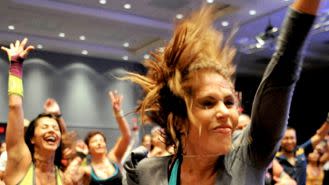6 Things to Consider Before Becoming a Fitness Pro
A fitness career can be very rewarding (and often comes with great perks like a free gym membership), but there's much more to becoming a successful trainer than most people know. To help you decide if you should get certified, we asked top experts what they wish they'd known as a budding trainer or group fitness instructor.
The Actual Class is the Easy Part

It might look like your Zumba instructor is having the time of her life (and she probably is!), but that doesn't mean her job is all fun and games. Before she even showed up at the gym, she likely spent hours compiling the perfect playlist, attending conferences to learn new moves, and practicing choreography cues in front of the mirror. It's easy to forget that being a group fitness instructor (or a personal trainer) is a job, says Caroline Dawson, managing director of Instructor Toolbox in New York City. "That often means arriving early for class (and staying late to help students or clean up studios), and hours of preparation to research music, choreography, the science of what you're teaching, etc," she says.
You Are Your Product

Becoming a personal trainer or fitness instructor means you are responsible for running your own business. A huge part of that is getting all of the appropriate certifications, CPR training, and liability insurance, says Jeff Bell, master trainer and owner of The Bell Fitness Company in New York City. Even though you'll spend your own money, time, and energy studying and passing your certification course(s), that's the easy part, he says. "The hard part is creating a sustainable business that doesn't absorb all of your physical and emotional energy trying to get clients." It's important to recognize that you're selling yourself as the product people will buy; so not only do you have to offer something of real value to a potential client, but you'll also have to constantly develop, update, market, and sell your product too, Bell says.
You Don't Get Paid to Work Out

The first thing I usually hear when someone asks about becoming a fitness instructor is, "it seems like such a fun job–I mean, you get paid to work out!" Not exactly. When you're on the clock as a trainer or instructor, getting in a good workout should be the last thing on your mind.
"Becoming a group fitness instructor means that you will be teaching other people and creating a safe and effective exercise experience for [your students], not for your personal workout," says Jessica Matthews, M.S., an exercise physiologist at the American Council on Exercise, ACE-certified group fitness instructor, personal trainer, and experience registered (E-RYT) yoga teacher. While you will demonstrate movements, all of the exercises you include in your classes (or with clients) should be done with the student's best interests in mind, not your own personal desire to get in a good workout, Matthews says. In fact, sometimes becoming a fitness professional makes it even harder to fit in your own workout, Dawson adds. "At the end of the day, after working in a gym, the last thing you'll want to do is stay for a personal workout. Motivating yourself can be challenging when you're teaching (or training) often."
There's Always More to Learn

Unlike some traditional desk jobs where you learn the tricks of the trade during orientation and then repeat the same duties every day, fitness is always changing, which means you'll have to do the same. "Exercise science is a constantly evolving field," Matthews says. "In order to ensure that your students receive the safest and most effective class experiences, you must understand that not only will you be teaching classes, you'll also be taking classes (workshops, conference sessions, online courses, webinars, etc.) to be the best instructor you can be." That means (if you want to stay competitive and improve your skills) you can plan on investing your money, time, and energy on a regular basis for continuing education. But if you choose fitness as your career, there's no doubt you'll find the latest research and training techniques fascinating.
You Must Be a Master Motivator

You may love a good sweat session, but (surprise!) there are a lot of people who don't-which is why inspiration is a huge part of a trainer's or instructor's role. "You may be knowledgeable, skilled, and/or physically fit, but can you get into the lives of other people and challenge them consistently enough to be the best version of themselves?" Bell asks. Getting your client to finish those last few reps of a tough exercise, or simply motivating your students just to come back to the gym is no easy feat. Not everyone responds well to a drill sergeant training style, while others hate to be coddled, so finding a balance of motivational skills that are unique to you, your message, and your clients is going to be vital to your success in this field.
"It takes months, if not years to acquire the skills necessary to be a top trainer. Help yourself first by being fit, healthy, and presentable in a professional way, and then cultivate that message into a deliverable set of skills or a training system that you can replicate over and over again," Bell says. "This creates exclusiveness by truly being unique and also builds in sustainability to the business because you're just doing what you love and it becomes totally natural for you."
Sometimes It's Thankless

This job can be incredibly rewarding-there's nothing like helping someone lose 50 pounds or feel their absolute best-but there will be some tough moments too. "For all the amazing experiences you will have as an instructor or trainer (and there will be many!), beware the flip side," Dawson cautions. "If you're sick and can't find a sub, you teach through it. If you're burnt out and just want to lounge on the coach watching bad reality TV, you have to rally to create excitement for your students [or clients]." Your "audience" will always have high standards and expectations that you might not always meet, so you'll have to be prepared to deal with people when they aren't so happy to see you too.
"Sometimes the gym is a safe place for your students to unleash, and they may complain and express their definite opinions, even when it's not warranted," Dawson says. "Being able to put your personal challenges and ego aside and maintain an upbeat and professional demeanor any time you teach [or train] is critical," she says.
The bottom line: Being a fitness professional can be a tough job and a big investment, but in the end, if you love what you do, it's all worth it, Dawson says.
